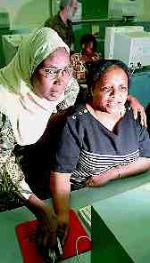 CREDIT: Debra Brash, Victoria Times Colonist
CREDIT: Debra Brash, Victoria Times Colonist Asha Ahmed of Zanzibar and Edith Sebatane are taking courses at the University of Victoria as part of the distance learning program.
 CREDIT: Debra Brash, Victoria Times Colonist
CREDIT: Debra Brash, Victoria Times Colonist
Asha Ahmed of Zanzibar and Edith Sebatane are taking courses at the University of Victoria as part of the distance learning program.
When Lydia Nyesigomwe and her group Action for Children moved to help Ugandan children orphaned by AIDS, they found grandmothers were the best entry point.
Nyesigomwe and her Kampala-based organization had initially thought they would work with households headed by orphaned children. But instead they ended up helping grandparents, to whom responsibility for child care had fallen when AIDS killed many parents.
"We discovered the greatest need was to support the grandmother-headed households," said Nyesigomwe.
In the context of an extended-family setting like an African village, her experience isn't entirely new. What is new, however, is Nyesigomwe has been sharing her experience with other people in Africa through an Internet education program co-ordinated through the University of Victoria.
The three-year pilot project, now in its third year, dubbed the Early Childhood Development Virtual University, has been operating through the School of Child and Youth Care at the University of Victoria.
The project is partially funded by a variety of groups including UNICEF, UNESCO, the Aga Khan Foundation and the World Bank. Also, participating African countries, through their governments, pay some costs.
UVic professor Alan Pence of the School of Child and Youth Care said the project has seen 27 people from 10 different countries sign up for post-graduate studies. About 12 are in Victoria this month to meet with some of the funding organizations and attend a conference on child care.
Pence said all the participants are working child-care professionals who were nominated by their governments. None of them are students planning a future career. They are already in one.
Also, he said the course work and study is driven mostly by the students themselves, working from their own cultural context and experience. He and others at UVic do not try to tell African child-care workers how African children should be raised.
"This is not about the University of Victoria coming and having the best ideas and the best way of doing things," said Pence.
Also, he said, while much of the instruction is delivered via the Internet, participants still meet face-to-face about once every six months at some agreed spot in Africa. This combination of meeting and Internet allows the participants to form relationships with their peers.
And those relationships will form a core of expertise that can grow and become self-sustaining in the long term.
Jenieri Sagnia, a UNICEF official in The Gambia, said he has already started to instruct others in his country about some of the ideas he has picked up in the course.
Sagnia said the Internet-supported relationships and instruction are proving hugely valuable as a means of learning, spawning new ideas and building up expertise.
"It's all about capacity building in Africa," he said.
"Together we are discussing the same thing but with different viewpoints," said Sagnia.